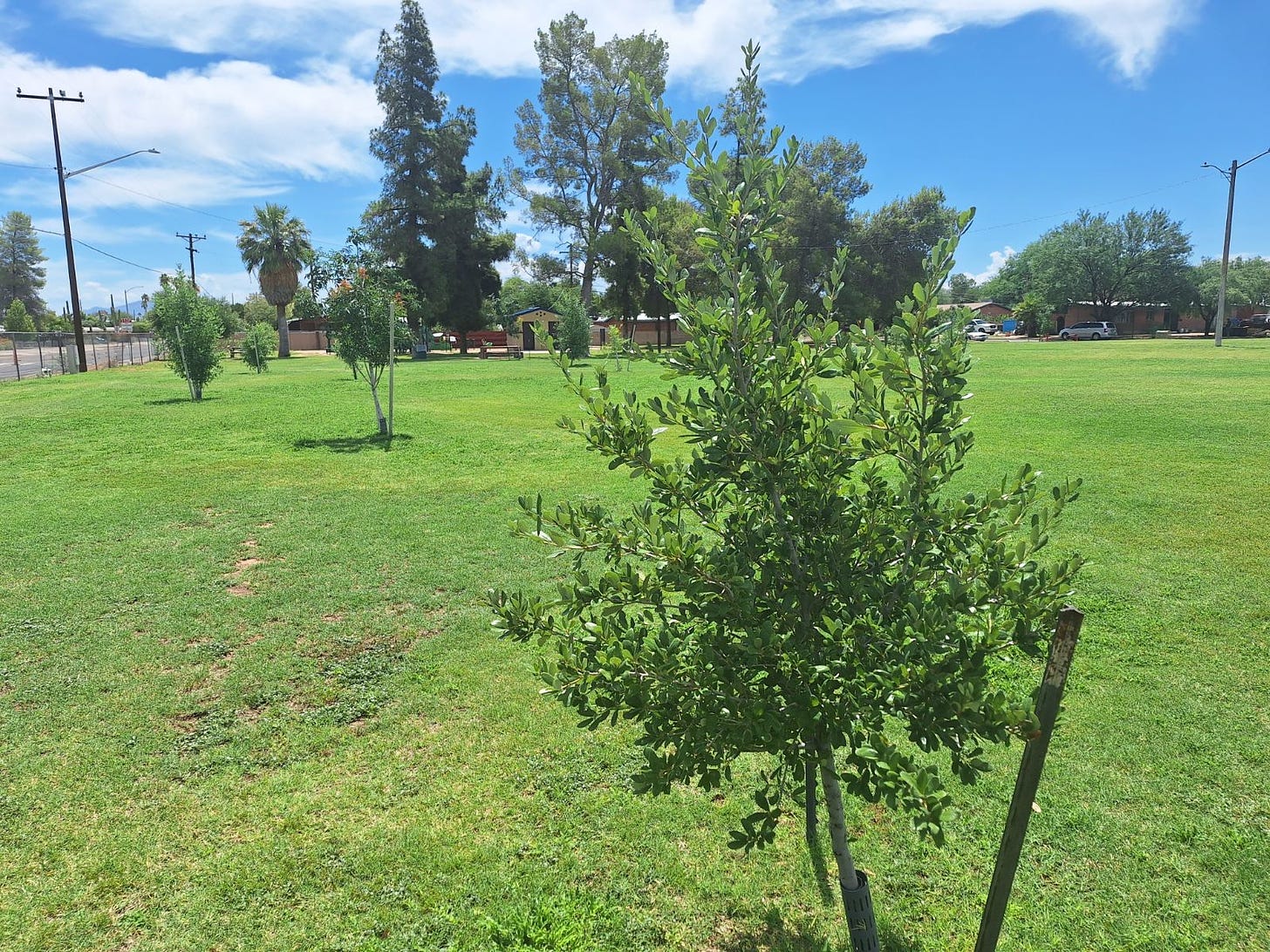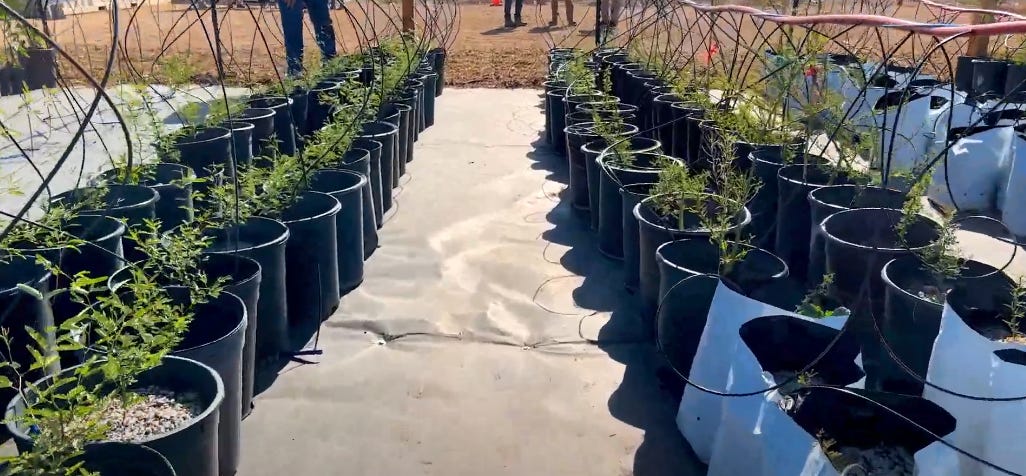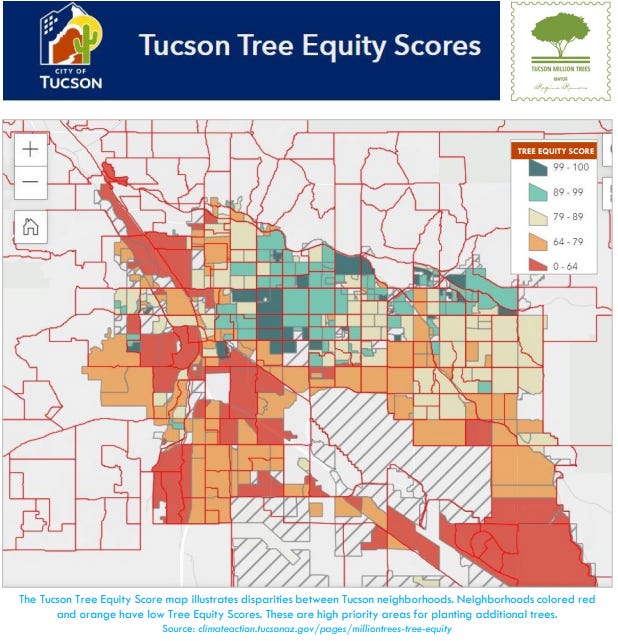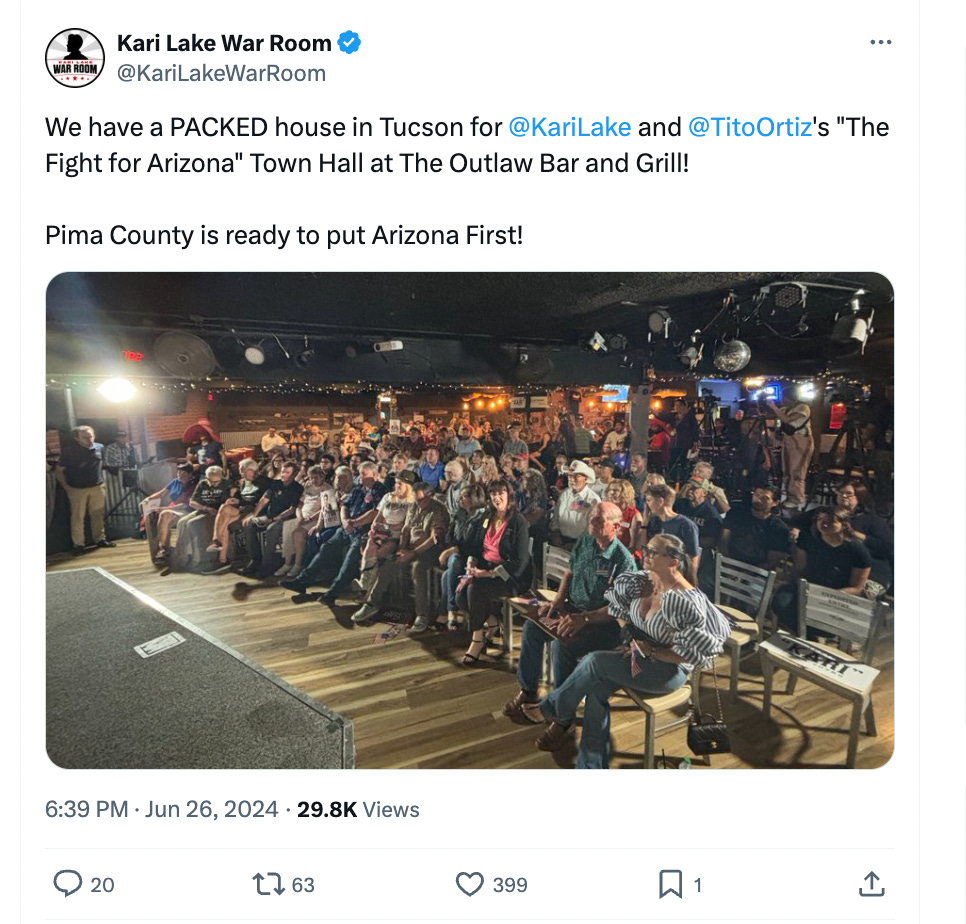The Climate Agenda: Seeding the future is a tree-mendous effort
Tucson’s nursery cradles a thousand future forest giants … Big plans ahead for the second year … Biden official points to big drop at border.
As the summer heat arrives, the City of Tucson is planning to add another 500 trees for shade in the areas of town hardest hit by scorching temperatures.
It’s part of the city’s Million Trees project, which began just over four years ago in May 2020. This summer’s trees will join the roughly 110,000 trees already planted on school grounds, parks, and community spaces throughout the city. While many of those trees came from local nurseries, the 500 being planted this summer come from the city dump.
Although, the Los Reales Sustainability Campus is no longer merely a dump. Alongside the many other projects on the campus, like composting, recycling, and methane gas collection, the city has been growing thousands of drought-tolerant trees, shrubs, and bushes for the past year.
Right now, tucked away in one corner of the campus are 1,000 seedlings in a tree nursery, part of the Tree Resource Education and Ecology (TREE) Center. So far, over 5,000 trees from that nursery have been planted across the city.
"This is where we are seeding the future of our Tucson Million Trees," said Mayor Regina Romero.
The nursery staff prioritizes using a diverse mix of native desert trees, which they choose from state-approved planting lists, including desert willow, red push pistache, velvet mesquite trees and many more.
Even though the nursery also plants native bushes and shrubs, they are not included in the count for the Million Trees project, said Nicole Gillett, the city’s urban forest manager.
The city has big plans for the nursery. Officials are trying to get to 6,000 trees every year with the help of other nurseries and organizations, like Sustainable Tucson and Tucson Clean and Beautiful.
But that’s not all. When they chose that part of the Los Reales campus, they had their sights set on being able to hold 15,000 trees. They’re hoping to make incremental progress toward that goal as they receive more funding, Gillett said.
So far, none of that money has come out of city taxpayers' pockets, officials said. Instead, the money comes from grants and local fundraising.
The city raised $900,000 from local groups like Sustainable Tucson and Tucson Clean and Beautiful, along with local businesses and residents. On top of that, the city got an Urban Forestry grant for another $750,000 for tree planting and care, along with a $100,000 grant from American Forests, a national nonprofit conservation organization.

If you want to see more of Curt’s absolutely stunning, one-of-a-kind photography, like the pic of the trees above, upgrade to a paid subscription today!
But the biggest boost came last September when the U.S. Department of Agriculture gave Tucson a $5 million grant for urban forestry.
“This investment is helping the City of Tucson grow more trees and prepare our youth to become the arborists of the future while activating the Los Reales Sustainability Campus to meet our goal of Zero Waste by 2050,” Romero said.
The trees are spread out across the city on public and private property, which makes it difficult for city officials to map out where each tree was planted. But they are going to high-priority areas, based on the city’s tree Tree Equity Map, Gillett said.
Desert cities should have at least 15% tree canopy coverage, according to American Forests. But Tucson averages only 6%, with some areas as low as 2%.
In Tucson, neighborhoods with little shade coverage often align with those experiencing high vulnerability with regard to income, education, and homeownership.
“Investing in our tree canopy benefits communities that have long seen disinvestment and is critical to protecting those most vulnerable to the impacts of extreme heat: children, our seniors, people with disabilities, workers exposed to heat, and the unhoused,” Romero said.
That canopy could grow as the new trees flourish over time, providing essential shade and cooling during the scorching summer months.
Border boss weighs in: Homeland Security Secretary Alejandro Mayorkas said Wednesday that Border Patrol agent encounters in the Tucson Sector have dropped 45% since President Joe Biden signed an executive order earlier this month, the Tucson Sentinel’s Paul Ingram reports. Mayorkas spoke to reporters at Davis-Monthan Air Force Base, praising border officials who he said did an “exceptional job” of quickly implementing the new policy, which partially suspends asylum requirements when daily unauthorized crossings tops 2,500 people.
Back and forth: A trio of local attorneys fired back in the pages of the Arizona Daily Star against an op-ed by State Rep. Alma Hernandez that they say falsely claims that Pima County Attorney Laura Conover never contributed to legislation or advocated on the issue of cash bail reform. Attorneys Tim Overton, past President of the Arizona Black Bar, ACLU of Arizona Legal Director Jared G. Keenan and Kevin Heade of Arizona Attorneys for Criminal Justice say in their op-ed that Conover worked with legal experts from all three of their organizations to develop a separate piece of cash bail legislation over the course of two years.
Getting creative: The City of Tucson is adapting a vacant fire station in the Amphi neighborhood into a resource center with transitional housing, the Arizona Republic’s Sarah Lapidus writes. The first-of-its-kind pilot project is part of the city’s Housing First Program and will convert Fire Station #8 into a day-use resource center and 35 microshelters with air conditioning and electricity. Kitchens, bathrooms and showers will be communal.
Settlement reached: The owners of the site of the Main Street fire in Bisbee have reached a settlement with the city, KGUN’s Madison Thomas reports. The fire started in Bisbee Oil and Vinegar on Valentine’s Day and led to the burning of several historical buildings on one of Bisbee’s most popular streets. Because the owners didn’t have property damage insurance or the funds needed to clean up the property, the city spent more than $163,000 on emergency and cleanup measures in the wake of the blaze.
Looking out for moms: Santa Cruz County’s Mariposa Community Health Center will receive $4 million in federal funding over the next four years to bolster maternal healthcare options in the county and other nearby rural areas, the Nogales International’s Angela Gervasi writes. Mariposa is the only clinic in Santa Cruz County providing OBGYN resources, including prenatal, labor and postnatal services, as well as reproductive healthcare.
Help is out there: This is Tucson’s Elvia Verdugo has compiled a huge list of mental health resources in and beyond Tucson for kids, teens, students and adults. The list includes local, state and national crisis hotlines, and details about services including counseling, food, shelters, employment, support groups and more.
If you’d like your group’s event featured in a future edition of the Climate Agenda, please send details to caitlin@tucsonagenda.com.
Using food and lifestyle to achieve summer balance
Join the Tucson Village Farm (4210 N. Campbell Ave.) tomorrow from 11 a.m. to 1:30 p.m. to learn about food and lifestyle adjustments that can help maintain balance during the hot summer months. Participants will learn about the best foods to balance heat during the summer, tips on how to stay cool with food and lifestyle changes and how to adjust their diet to align with the seasons and times of day. The event will end with a communal lunch of different types of balancing foods. Tickets are $30 for ages 16 through 24 and $60 for ages 24 and up, and include a downloadable recipe book, slides and notes from the workshop and a $10 coupon to use at an upcoming Tuesday Market. Learn more and buy tickets here.
Kids get into Flandrau for half the price
This Sunday is the final weekend to take advantage of the Flandrau Science Center and Planetarium’s (1601 E. University Blvd.) half-price kids admission special on Sundays in June. Tickets include admission to all science exhibits and planetarium shows, including the center’s newest exhibit, Undersea Discovery, which features a touch tank experience. Tickets are available for in-person purchase only and there’s a limit of five discounted kid tickets for every adult ticket purchase. Click here for additional details.
How low can you go?
Join the Watershed Management Group at its Living Lab demonstration site (1137 N. Dodge Blvd.) next Saturday from 8 to 10 a.m. for a fun activity exploring the systems the group has in place to reduce its dependency on distant watersheds and make it possible to exist mostly on rainwater, stormwater and greywater. Attendees will learn about opportunities to use harvesting in their own homes, neighborhoods and work places. The workshop will be outside, so participants are asked to be prepared for all types of weather. The event is free, but advanced registration is required. Learn more and sign up here.

Learn how to save with water harvesting
The Watershed Management Group is offering a pair of free water harvesting classes next month, with both in-person and virtual options. First up is its free in-person water harvesting class on Tuesday, July 9 from 8 to 10:30 a.m. at the Living Lab (1137 N. Dodge Blvd.) where attendees will learn about passive rainwater harvesting, active rainwater harvesting and how to qualify and apply for Tucson Water's Rainwater Harvesting Incentives Rebate Program. Find details and register here.
On Thursday, July 11, the group is hosting a virtual greywater class from 5 to 7 p.m. that will teach attendees how to use their washing machines as a consistent source of greywater irrigation for high water use plants, like food-producing trees and shrubs. The class meets the requirement for Tucson Water's greywater rebate and walks participants through the process of applying for the greywater rebate. Learn more and sign up here.
Beat down buffelgrass at Tucson Mountain Park
Join the Sonoran Desert Weedwackers and Pima County Conservation Lands and Resources on Wednesday, July 10 from 6 to 9 a.m. at Tucson Mountain Park for a morning of buffelgrass removal. Volunteers should be ready to hike and come prepared to go off trail and work in the heat. The cleanup will end early if needed and organizers will provide snacks and drinks at the end. Tools and work gloves will be provided and volunteers are asked to bring lots of water, snacks, a backpack and sunscreen. Come dressed in long pants, sturdy shoes and sun protection. Find details and register here.
Meet the birds of Mission Garden
Explore Mission Garden with one of its expert birders on Thursday, July 11 from 8 to 9:30 a.m. The bird walk is free, but a $5 donation is suggested for entrance to the garden (946 W. Mission Ln.) Attendees will meet at the front gate and look for seasonal and resident birds, learning to identify some common calls and songs. The garden is a good place for beginner and intermediate birders to learn about many of the birds that are common in the greater Tucson area and attendees also have the opportunity to learn about the history of Tucson's agriculture and some of the crops that have been important. No need to register in advance. Find more information here.
Upcoming meetings
City of Tucson Citizens’ Water Advisory Committee - Wednesday, July 3 at 8 a.m.
City of Tucson Complete Streets Coordinating Council - Wednesday, July 24 at 5:30 p.m.









